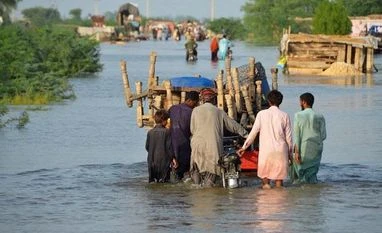An IMF team is expected to visit Pakistan early in November to start the next review of the country's current economic programme, a senior official of the global lending body has said.
In its last review in August, the International Monetary Fund (IMF) approved the 7th and 8th tranches of USD 1.17 billion, of its USD 7 billion Pakistan programme which was signed in 2019.
The global lender said that it would send a mission in November to Pakistan after the annual meetings as part of preparations for the next review, IMF's Director of the Middle East and Central Asia, Jihad Azour was quoted by Dawn newspaper on Thursday.
At a media briefing in Washington, Azour extended support to the flood-hit country. We accelerated some of our disbursements to help Pakistan deal with recent shocks, such as the increase in prices of foods and commodities, he said.
Hopefully, we will be fielding a mission in November, after the annual meetings, to Pakistan to start the process for the next review," Azour said.
The Fund has been very supportive of Pakistan. We have a programme with Pakistan that has been extended and increased in size. This is to help Pakistan deal with a confluence of shocks, starting with the Covid crisis where we provided additional flexibility, the IMF official said.
In a reply to questions regarding the Fund's plan for Pakistan given the economic devastation caused by the recent floods, Azour said the IMF is waiting for the World Bank and the UN Development Programme's ongoing evaluations of the flood damage to assess the situation and provide help accordingly.
More From This Section
Based on this assessment, we will update our data and we will also (engage) with the authorities to see what their priorities are and how the Fund can help, the IMF official said, the Dawn newspaper reported.
The IMF regional director spoke against 'untargeted subsidies' as regressive incentives that have proved to be counterproductive and urged Pakistan, and other countries, to relocate limited resources to those who need them.
"This is something that it's not, I would say, part of the IMF conditionalities, this is part of what is needed in order to provide the right protection for those who need it at the time where inflation is very high," he said, according to the report.
Pakistan's teetering economy is facing a balance of payments crisis, a ballooning current account deficit, and inflation hitting an all-time high of 27 per cent.
The devastating floods, which left more than 1,600 dead and displaced more than 30 million people, added to Pakistan's forex woes, with an estimated loss of over USD 28 billion to the economy.
In August, New York-based rating agency S&P Global revised Pakistan's long-term ratings from 'stable' to 'negative' given the spiralling inflation and tighter global financial conditions.
)